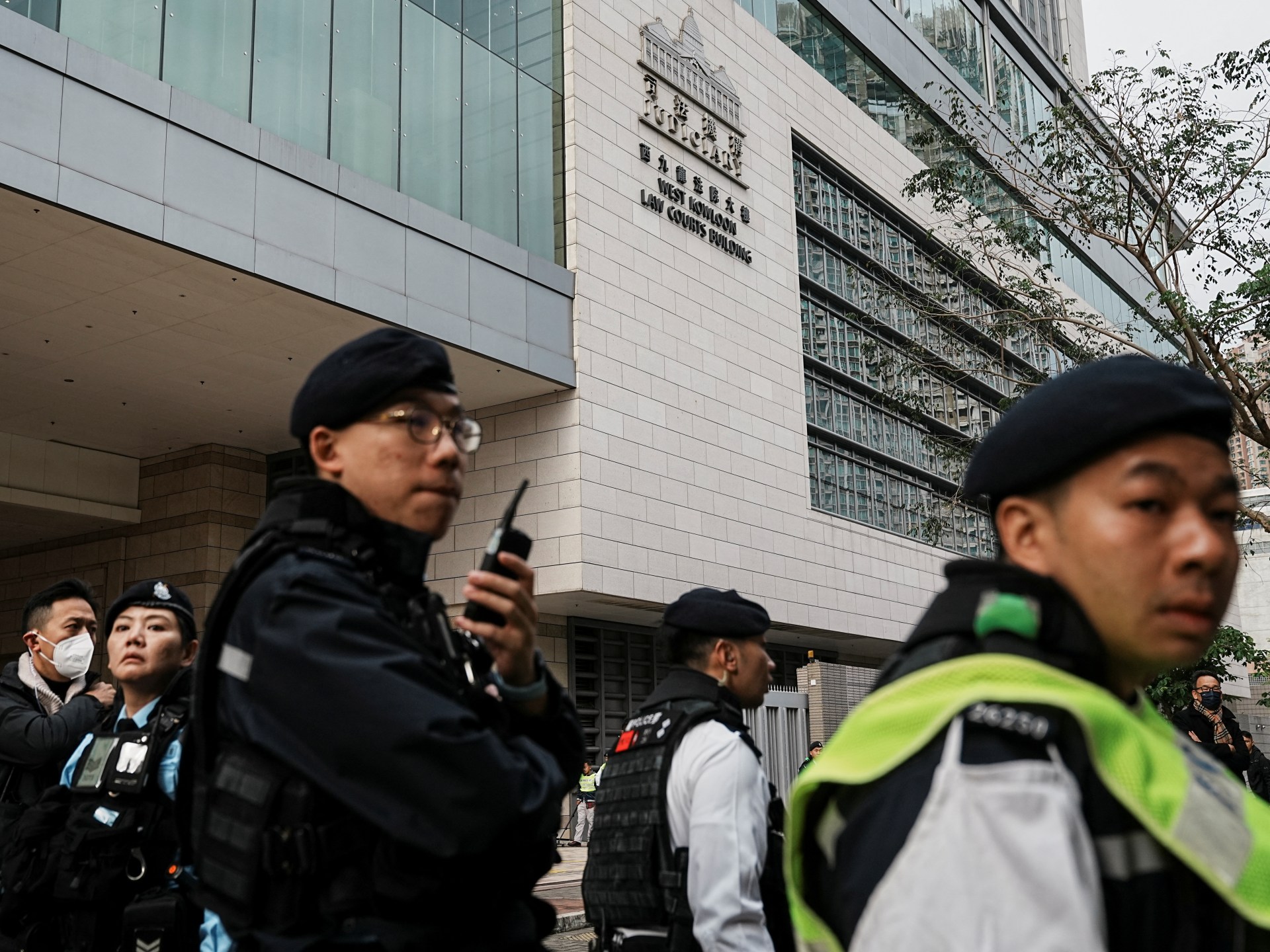BREAKINGBREAKING,
The media tycoon and democracy supporter, now 76, has been in jail for three years, accused of ‘collusion with foreign forces’.
Hong Kong media tycoon Jimmy Lai has gone on trial for alleged national security offences, hours after the United Kingdom joined calls for his immediate release.
Lai, who has been imprisoned since December 2020, arrived in court at 10am (02:00 GMT) where he is charged with conspiring to collude with foreign powers under the national security law imposed on the territory by China in June 2020.
Journalists inside the court said the 76-year-old, who was dressed in a blue shirt and carrying a book, looked like he had lost weight, but appeared in good spirits.
The publisher of the now-defunct Apple Daily is one of China’s most vocal critics and was arrested initially in August 2020 as police raided the newspaper’s officers.
The trial was supposed to have started a year ago, but was delayed after the government raised questions about his choice of defence counsel, Timothy Owen, a UK-based lawyer, and sought Beijing’s intervention.
Lai and the Apple Daily also face charges under a sedition law dating from the British colonial era.
He has pleaded not guilty to all charges.
In a statement late on Sunday, UK Foreign Secretary David Cameron said he was “gravely concerned” about the trial and joined the United States and European Union in calling for Lai’s immediate release.
“As a prominent and outspoken journalist and publisher, Jimmy Lai has been targeted in a clear attempt to stop the peaceful exercise of his rights to freedom of expression and association,” Cameron said, noting that the security law was in breach of the commitments made to Hong Kong when it resumed sovereignty over the territory in 1997.
“I urge the Chinese authorities to repeal the National Security Law and end the prosecution of all individuals charged under it. I call on the Hong Kong authorities to end their prosecution and release Jimmy Lai.”
‘Rule by law’
Hong Kong’s pro-democracy politicians, once vibrant civil society and media came under pressure in the wake of mass demonstrations in 2019, which began over concerns about a planned extradition bill with mainland China and evolved into calls for greater democracy.
A year after it was imposed, Amnesty International said the security law had “decimated” Hong Kong’s rights and freedoms.
The US also called for Lai’s immediate release and condemned the prosecution.
“Lai has been held in pre-trial detention for more than 1,000 days, and Hong Kong and Beijing authorities have denied him his choice of legal representation,” US State Department spokesperson Matthew Miller said in a statement. “We call on Hong Kong authorities to immediately release Jimmy Lai and all others imprisoned for defending their rights.”
Security on Monday was tight after Secretary for Security Chris Tang warned it would be enhanced because previously, “these kinds of cases” had attracted people wanting to disrupt proceedings and harass prosecutors.
People began queueing early for tickets with just 70 seats in the main venue at the West Kowloon court building open to the public.
Some police were in riot gear, while others had dogs. A bomb disposal vehicle was parked nearby.
“Jimmy Lai’s case is a case of weaponising the legal system in Hong Kong,” Finn Lau, a UK-based activist and founder of Hong Kong Liberty, told Al Jazeera. “There is no rule of law in Hong Kong anymore. It is just rule by law.”
Lai has already been found guilty and jailed over separate cases related to the management of Apple Daily and his involvement in a vigil to mark the 1989 Tiananmen Square massacre.
The final edition of the Apple Daily rolled off the presses in June 2021.
Other publications critical of the administration have also folded, while elections have been overhauled to ensure only so-called “patriots” are able to hold public office in the territory.
Last week’s elections for district councils saw a record-low turnout of just 27.5 percent. The number of directly elected seats was cut to just 88, compared with 462 previously, and all candidates had to secure official approval before they could stand.
“Actions that stifle press freedom and restrict the free flow of information – as well as Beijing and local authorities’ changes to Hong Kong’s electoral system that reduce direct voting and preclude independent and pro-democracy party candidates from participating – have undermined Hong Kong’s democratic institutions and harmed Hong Kong’s reputation as an international business and financial hub,” Miller said in his statement.
Check out our Latest News and Follow us at Facebook
Original Source

